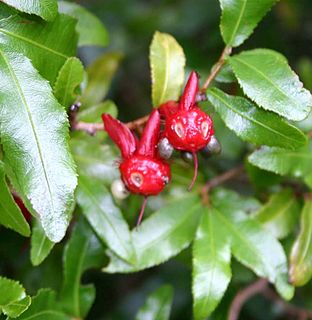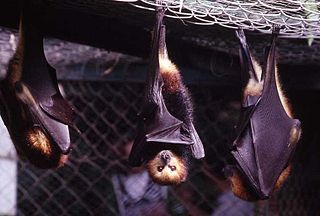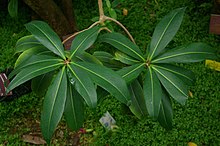
Erica is a genus of roughly 857 species of flowering plants in the family Ericaceae. The English common names heath and heather are shared by some closely related genera of similar appearance. The genus Calluna was formerly included in Erica – it differs in having even smaller scale-leaves, and the flower corolla consisting of separate petals. Erica is sometimes referred to as "winter heather" to distinguish it from Calluna "summer heather".

The Mascarene Islands or Mascarenes or Mascarenhas Archipelago is a group of islands in the Indian Ocean east of Madagascar consisting of the islands belonging to the Republic of Mauritius as well as the French department of Réunion. Their name derives from the Portuguese navigator Pedro Mascarenhas, who first visited them in April 1512. The islands share a common geologic origin in the volcanism of the Réunion hotspot beneath the Mascarene Plateau and form a distinct ecoregion with a unique flora and fauna.

Ochna is a genus comprising 86 species of evergreen trees, shrubs and shrublets belonging to the flowering plant family Ochnaceae. These species are native to tropical woodlands of Africa, the Mascarenes and Asia. Species of this genus are usually called ochnas, bird's-eye bushes or Mickey-mouse plants, a name derived from the shape of the drupelet fruit. The name of this genus comes from the Greek word Ochne, used by Homer and meaning wild pear, as the leaves are similar in appearance. Some species, including Ochna integerrima and O. serrulata, are cultivated as decorative plants.

Pericallis is a small genus of 15 species of flowering plants in the family Asteraceae, native to the Canary Islands, Madeira and Azores. The genus includes herbaceous plants and small subshrubs. In the past, the genus was often included in either Cineraria or Senecio.

Ocotea is a genus of flowering plants belonging to the family Lauraceae. Many are evergreen trees with lauroid leaves.
This article is one of a series providing information about endemism among birds in the world's various zoogeographic zones. For an overview of this subject see Endemism in birds.

Securinega is a genus of plants in the family Phyllanthaceae, first described as a genus in 1789. As presently conceived, the genus is native to Madagascar and the Mascarene Islands in the Indian Ocean. In the past, it was considered to be much more widespread, thus explaining the long list of species formerly included. It is dioecious, with male and female flowers on separate plants.
- Securinega antsingyensisLeandri - W Madagascar
- Securinega capuroniiLeandri - W Madagascar
- Securinega durissimaJ.F.Gmel. - Madagascar, Mauritius, Réunion, Rodrigues Island
- Securinega perrieriLeandri - W Madagascar
- Securinega seyrigiiLeandri - W Madagascar

The Mauritian flying fox, also known as Greater Mascarene flying fox or Mauritius fruit bat is a large megabat species endemic to Mauritius and La Réunion.

The Niam-Niam parrot (Poicephalus crassus) is a parrot nearly endemic to the Central African Republic, of the genus Poicephalus. It is a mostly green parrot with a grey-brown head and orange irises. The Niam Niam is one of the world's most poorly-known parrots, with little known of its conservation status, and was one of the last unphotographed birds in Africa until 2017.

Dombeya is a flowering plant genus. Traditionally included in the family Sterculiaceae, it is included in the expanded Malvaceae in the APG and most subsequent systematics. These plants are known by a number of vernacular names which sometimes, misleadingly, allude to the superficial similarity of flowering Dombeya to pears or hydrangeas. Therefore, the genus as a whole is often simply called dombeyas. The generic name commemorates Joseph Dombey (1742–1794), a French botanist and explorer in South America, involved in the notorious "Dombey affair", embroiling scientists and governments of France, Spain, and Britain for more than two years.

The Mascarene martin or Mascarene swallow is a passerine bird in the swallow family that breeds in Madagascar and in the Mascarene Islands. The nominate subspecies occurs on Mauritius and Réunion and has never been found away from the Mascarene Islands, but the smaller Madagascan subspecies, P. b. madagascariensis, is migratory and has been recorded wintering in East Africa or wandering to other Indian Ocean islands.

The Mascarene paradise flycatcher is a species of bird in the monarch-flycatcher family Monarchidae. It is endemic to the Mascarene islands of Mauritius and Réunion. There are two subspecies recognized: the nominate subspecies from Réunion, also known as the Réunion paradise flycatcher; and T. b. desolata from Mauritius. The Mascarene paradise flycatcher was originally described in the genus Muscicapa and the subspecies T. b. desolata was originally described as a separate species.
Badula platyphylla is a species of plant in the family Primulaceae. It is endemic to Mauritius. Its natural habitat is subtropical or tropical dry forests.
Badula reticulata is a species of plant in the family Primulaceae. It is endemic to Mauritius.
Coffea charrieriana, also known as Charrier coffee, is a species of flowering plant from the Coffea genus. It is a caffeine-free coffee plant endemic to Cameroon in Central Africa. It is the first recorded caffeine-free Coffea in Central Africa, and the second to be recorded in Africa. The first caffeine-free species was previously discovered in Kenya, named C. pseudozanguebariae. The International Institute for Species Exploration at Arizona State University and a committee of taxonomists and scientists voted the C. charrieriana as one of the top 10 species described in 2008.
Azumamorula mutica, common name the smooth ricinula, is a species of sea snail, a marine gastropod mollusk in the family Muricidae, the murex snails or rock snails. It is the only species in genus Azumamorula.

The flora of Madagascar consists of more than 12,000 species of plants, as well as a poorly known number of fungi and algae. Around 83% of Madagascar's vascular plants are found only on the island. These endemics include five plant families, 85% of the over 900 orchid species, around 200 species of palms, and such emblematic species as the traveller's tree, six species of baobab and the Madagascar periwinkle. The high degree of endemism is due to Madagascar's long isolation following its separation from the African and Indian landmasses in the Mesozoic, 150–160 and 84–91 million years ago, respectively. However, few plant lineages remain from the ancient Gondwanan flora; most extant plant groups immigrated via across-ocean dispersal well after continental break-up.

Pandanus rigidifolius is a species of plant in the family Pandanaceae, endemic to Mauritius.

Pandanus eydouxia is a species of plant in the family Pandanaceae, endemic to Mauritius.
Oncostemum are a genus of flowering plants in the family Primulaceae, native to the Comoros and Madagascar. The Mascarene Islands endemic genus Badula appears to nest inside Oncostemum.














